Blog Benefits: 38 Ways That Blogging Helps SEO and Rankings

We all talk about blogging as an SEO strategy, but how often do we dig into the real, tangible benefits that you can get out of blogging?
Well, I've decided to cover both the direct and indirect benefits that blogging has on your search engine optimization, rankings, and inbound marketing as a whole. You'll find there are many benefits of blogging, and this guide will cover some of the most significant ones. If you need a little convincing to get that blog up and running or keep it going, look no further.
Let's dig in!
 30 Second Summary
30 Second Summary
You'll get many benefits from blogging that help your SEO and business growth. Your regular blog posts let Google know your site is active and give you chances to rank for new keywords. Every post you write can bring in traffic, earn backlinks and build trust with readers. You can use your content to show expertise, grow your email list and improve your site's overall quality scores. Your blog also helps you create internal links between pages and gives visitors more ways to engage with your brand. Over time, blogging compounds to make your site more resilient and authoritative.
1. Google Loves Fresh Content
Fresh content doesn't rank well every time – most search results are at least a year old for evergreen topics, but it helps the site rank better holistically. Google loves blogs that stay active because it's a sign that the business owner behind them is actively updating their site and is still in business. An abandoned blog doesn't represent a site that Google wants to recommend to people; what if they make an order and it never ships?
It's also worth mentioning that Google wants you to keep your blog updated consistently, but they don't care how often you do. Once a week or even once every two weeks can be fine, so long as it's steady and predictable. If your blog goes dark and stops publishing content for a long time, external links start to break, comments go unanswered, competition builds, and cobwebs start to accumulate. It happens quicker than you think.
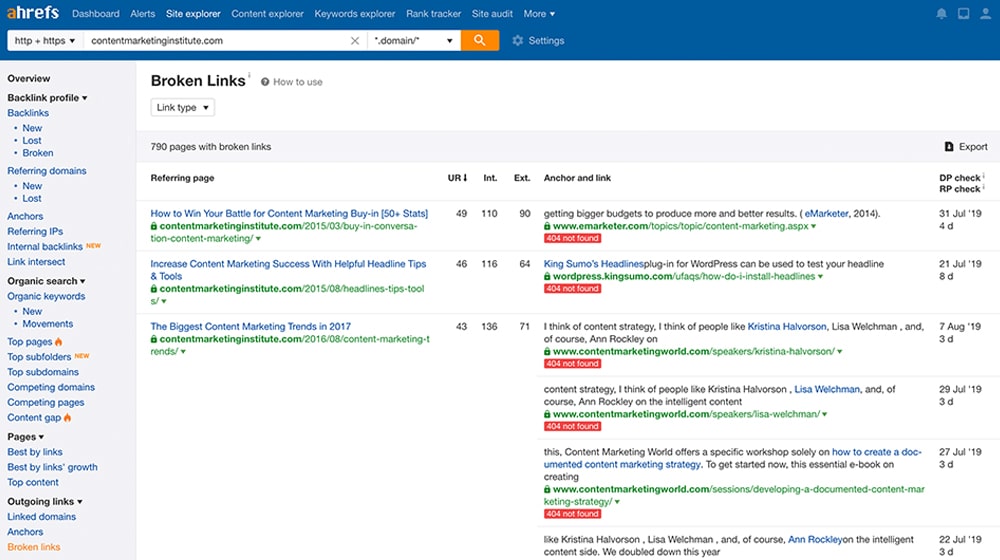
Some webmasters think it's better to post many blog posts at once rather than stagger them out, but this may confuse search engines and visitors. This process ends up being more work, and search engine spiders are not sure how often they should be checking your site for new content. People also aren't generally fans of giant floods of new content, and you want to give them a reason to subscribe. It's a much better bet to post new content at a slow and predictable rate.
Search engines want to ensure that the content is as up-to-date as possible. They also want to prevent potential security issues and the threat of a site disappearing one day with no warning. Dust off those cobwebs! An active site with regularly-published fresh content is a healthy site.
2. Google Loves Evergreen Content
One of the core focuses of blogging is creating evergreen content. Evergreen content can last and hold value for years after being produced, with a bit of maintenance to keep it from decaying over time. Google loves this kind of content. After all, a massive amount of traffic passing through Google is doing so for informational queries.
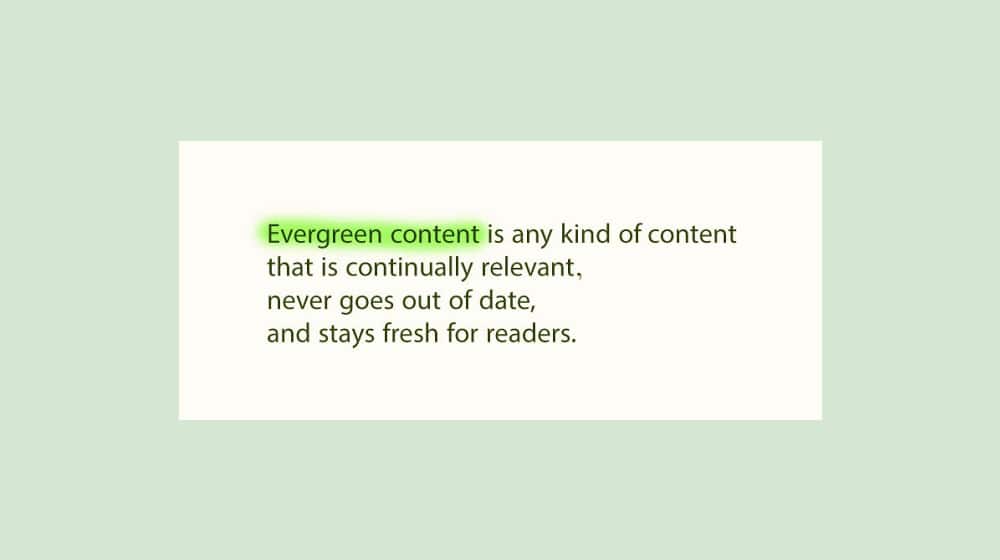
Informational queries work best when relatively static and central authorities have the information to answer them. That's why sites like Wikipedia are consistently among the top websites for informational queries. The more evergreen resources you can create, your SEO will be better.
3. Blog Posts Build Traffic
Websites need to acquire traffic to survive. Every blog post you write and publish is a chance for users to find your site and an opportunity for them to decide they want to subscribe or return later. Every post you rank is a post that can bring in more organic search traffic, from Google, from Bing, social media, or what have you.
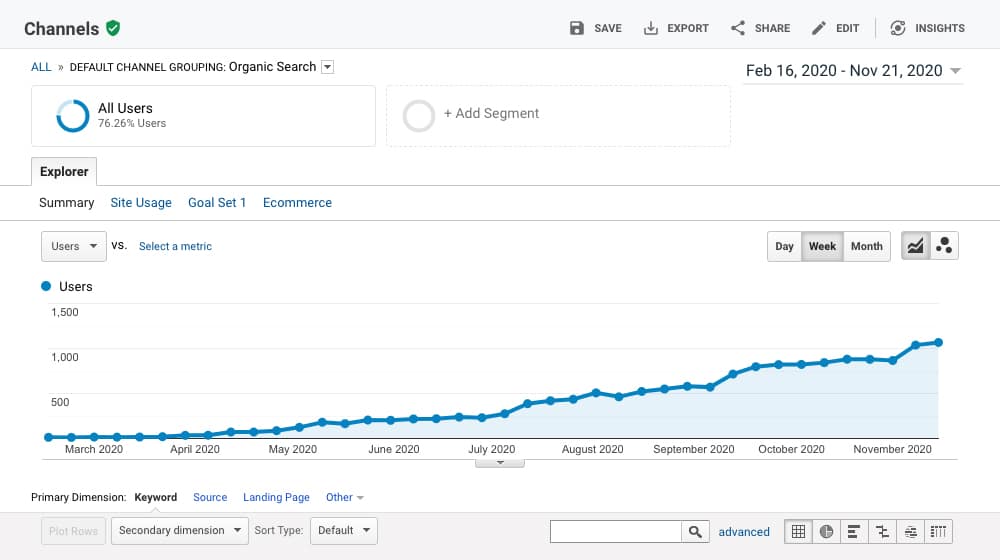
More traffic means more resources you can use to grow other metrics and improve your content relevancy. Blogs can take a while to start getting traffic, though; if you're patient and can get over the hump, it will pay off.
4. Blog Traffic Increases Leads
Consider the simple math of an online marketing strategy. If you have a 5% conversion rate, that means five out of every hundred visitors will convert. If you have 100 visitors per month, that's five conversions per month. If you increase your traffic to 500 visitors per month, you end up with 25 conversions per month. The more traffic you get, the more conversions and leads from your blog content.
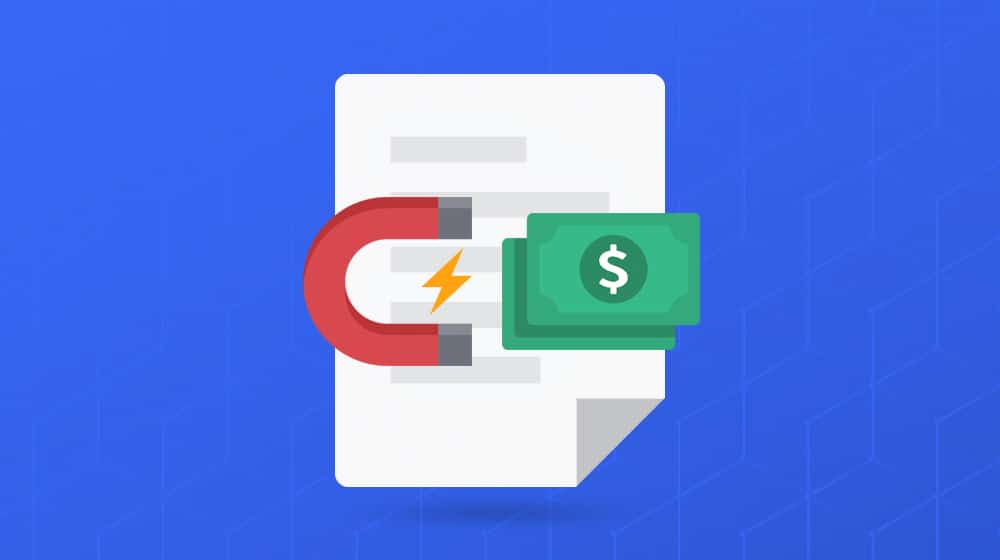
Yes, I know, it's not quite that simple. Often, increasing traffic means decreasing conversion rates until you can more accurately target and optimize your funnels for the traffic you're getting (since the audiences won't just be identical but larger, they'll be different and more varied). Of course, there are occasions where an increase in traffic can be negative (like if it's not relevant or they are bot visitors), but rarely.
5. Good Posts Increase Time On Page
A blog is a great way to engage with users, and when users are engaged, they linger on the page. They might want to read through the whole post or read through part of it and click through to a different page on the same site. Either way, time spent on-page is one of those metrics that are helpful, even if it's hard to pin down exactly how.
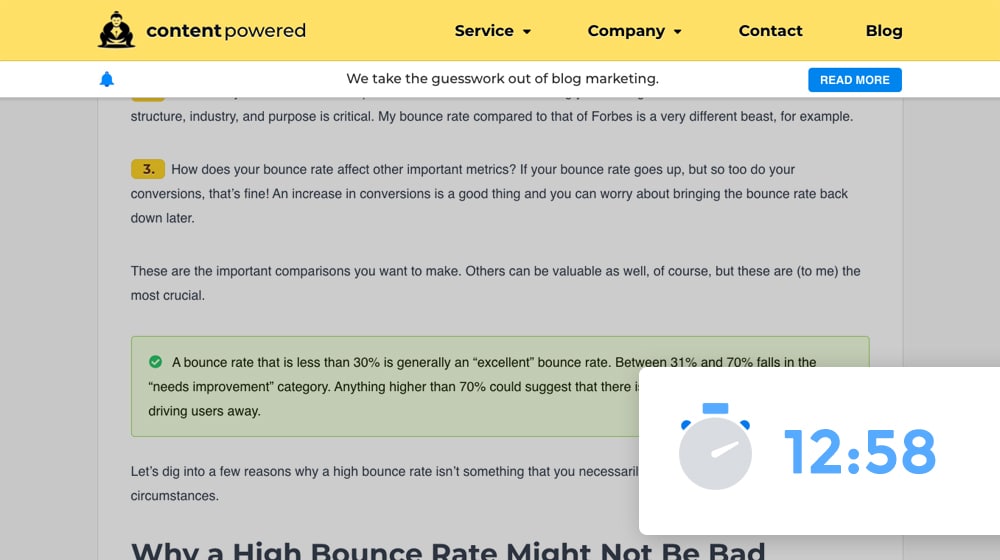
In a related way, the longer you keep people around, the more likely they are to click something or interact with your page. Improving your "time on site" metrics helps you get more valid sessions and a more accurate view of your bounce rate.
6. Every Keyword is a Ranking Opportunity
Every blog post you write for your site is a chance to target a new keyword you haven't targeted before. Every new keyword you target for your site is a unique chance for Google to rank you highly for a piece of content.
This technique fills in gaps in coverage for your site, makes you more of a complete resource rather than a partial resource, and builds more robust brand awareness. Your eventual goal is to ensure that nearly any search a user could make related to your industry has a relevant post somewhere in your archive, though this can take years to achieve in practice. I'm still working on it myself - a blog is constantly growing.
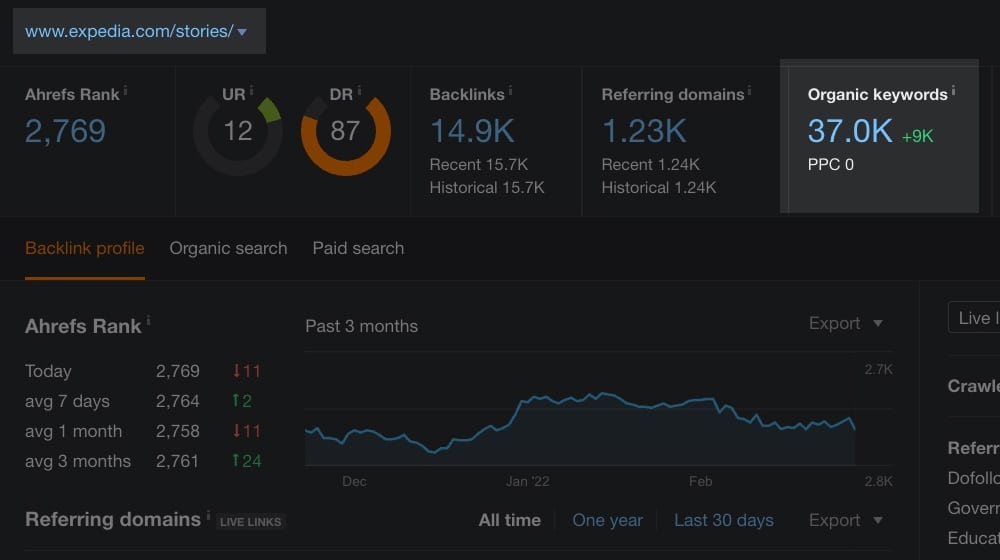
Not all target keywords will result in a lot of traffic or even much traffic at all. That's fine, though; you never know which one will hit it off until you try, and even when a page doesn't get you much traffic, it can still get you some traffic. When you consider the 80/20 rule, too, you need to keep producing content to build up more in that 20%.
When in doubt, focus on blog posts surrounding buyer intent and pain point topics. Customers can also be a fantastic source of topic ideas; try taking some of the questions or pain points that led your customers to your business and write a helpful guide about that subject.
7. Appearance in SERPs Builds Brand Recognition
Have you ever been watching a movie and seen someone you recognize but don't know the name of? "Hey, it's That Guy!" Some actors have entire careers based on being That Guy.
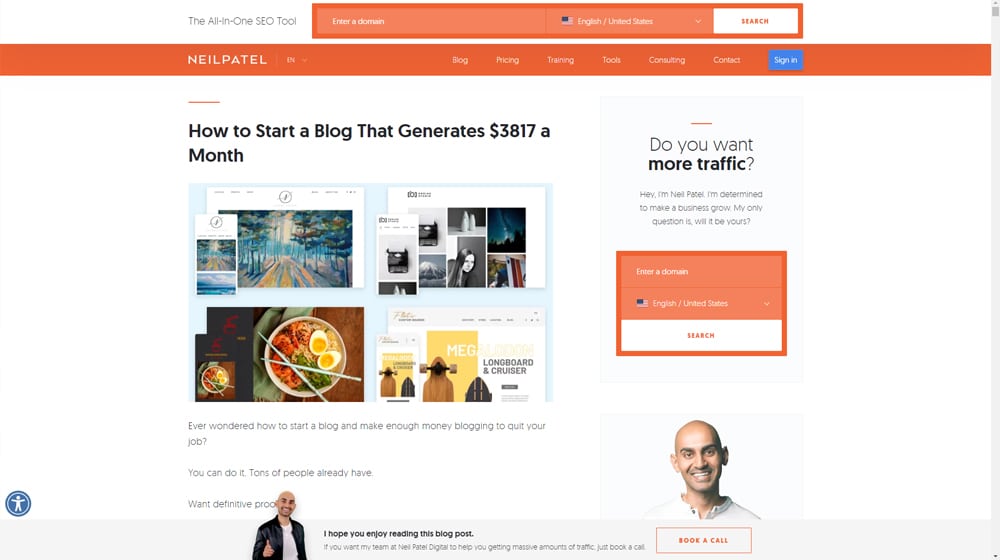
In a way, you can do the same thing by publishing and getting your content to rank consistently and in volume. People in the industry looking for content will find you. Even if they don't click on you, they'll start to recognize you, and that exposure makes them begin to trust you. After all, how would you rank that often for that much content if you didn't have something going for you? Then, people start clicking, and you realize that growth.
Whether it's on social media or another blog, even an unlinked mention can be valuable to your brand and SEO strategy. Some clever marketers even turn unlinked mentions into links by sending emails to these bloggers. Ahrefs has a great guide on this subject here.
8. Blog Posts Earn Backlinks - Linkbait Posts Earn More
Rolling on with "every post is an opportunity," every single blog post you publish is a chance for other blogs out there to link to you. Smaller blogs will link to you when they want something more authoritative than to back up their points. More prominent blogs will link to you as a resource, for example, or just as something relevant to their discussion. Links, of course, are the backbone of the internet (they're what makes up the strands of the World Wide Web, after all), so getting more of them, even passively, is a great idea.
You may be surprised by the links that start to show up. Most people don't even realize that their blog is accumulating great backlinks. You'll need to use SEO software like SEMrush or Ahrefs to monitor your links each week.
Linkbait posts are one of the 12 types of blog posts that you can find on a blog. They're posts that are specifically engineered to be linkable resources; they are kept up to date, made to be as evergreen as possible, and are designed to be irresistible to link to.
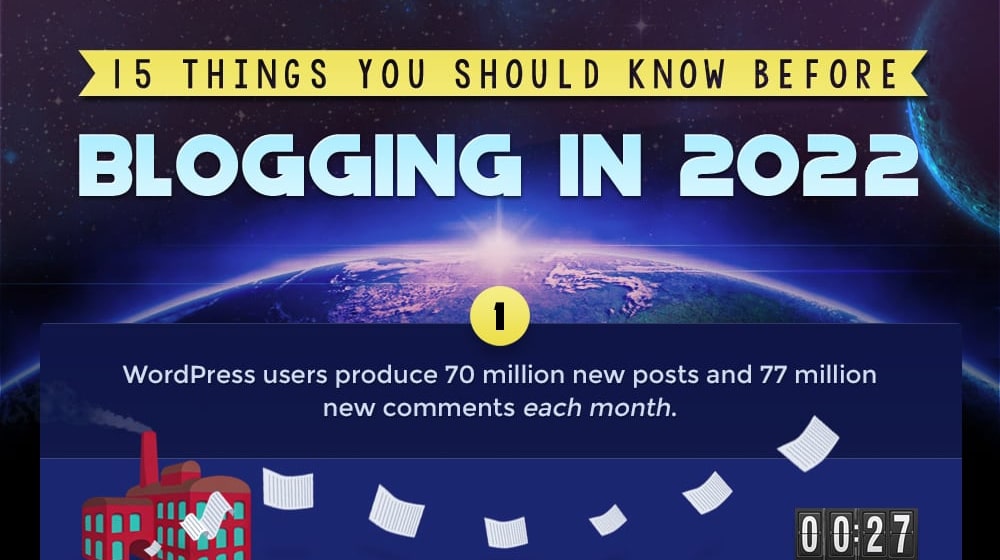
The goal with them is to get people within your industry to link to those posts because of the value they represent. These include posts such as listicles, infographics, facts and stats, and other massive link-worthy posts. If you've put a massive amount of effort into an article and it's ten times better than anything else available, there's a good chance that you've created a fantastic link bait article.
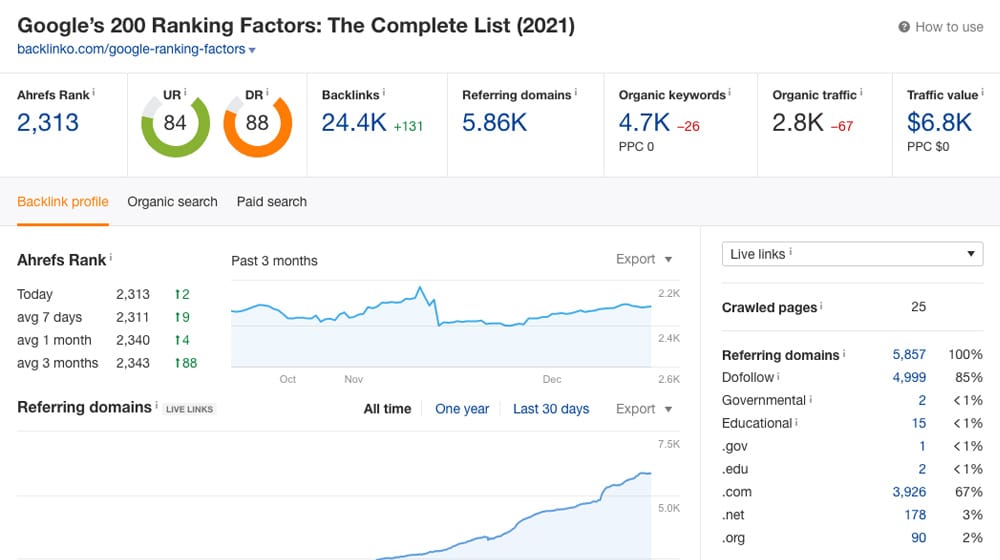
Links, of course, are foundational to Google's algorithm and are immensely valuable and important. Without links, the results on search engines would not be as valuable. They've tried it in the past, and search quality suffered.
9. Broader Content Facilitates Broken Link Building
Another way a blog benefits you with links is through broken link building. With broken link building, you seek out backlinks that have broken online when their original destinations change, move, or die off. You then message the webmaster about it and offer similar content as a working replacement.

The more content you have, the better you can target broken links with exact replacements. It doesn't work often, but it works often enough to be worth doing.
10. Content is a Chance to Demonstrate Expertise
There are some "intangible" benefits alongside the SEO benefits of blogging—for example, expertise. People like to know that you're an expert in whatever they're reading about. Usually, your author bio helps sell this, though, of course, anyone can claim anything they want online.
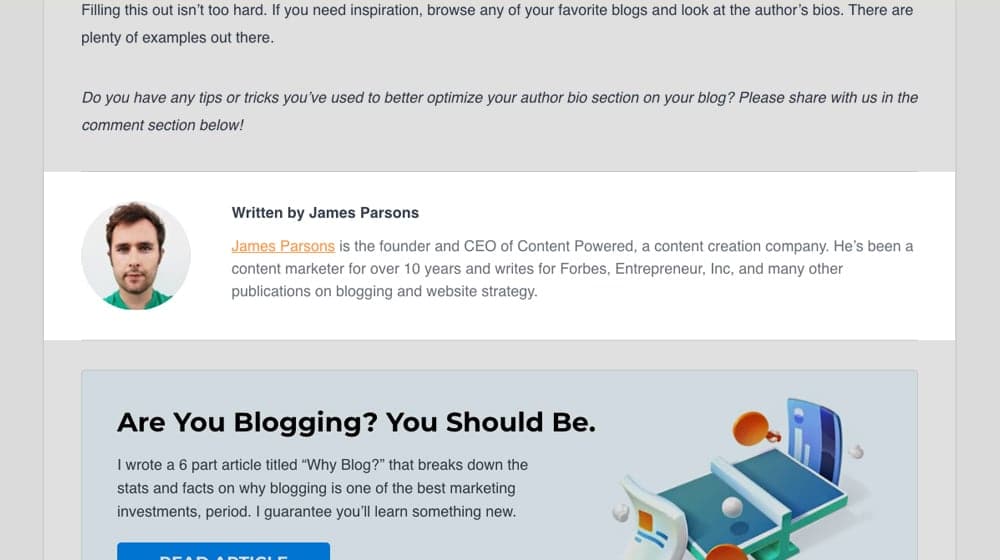
What can't be as quickly made up is the volume of content you've produced, showcasing your expertise. It's hard to fake being an expert when you demonstrate it constantly, after all.
One of the most important intangible aspects of SEO is thought leadership. If I say a name like Brian Dean, Neil Patel, or Seth Godin, you know who I'm talking about because they're respected and well-known people.
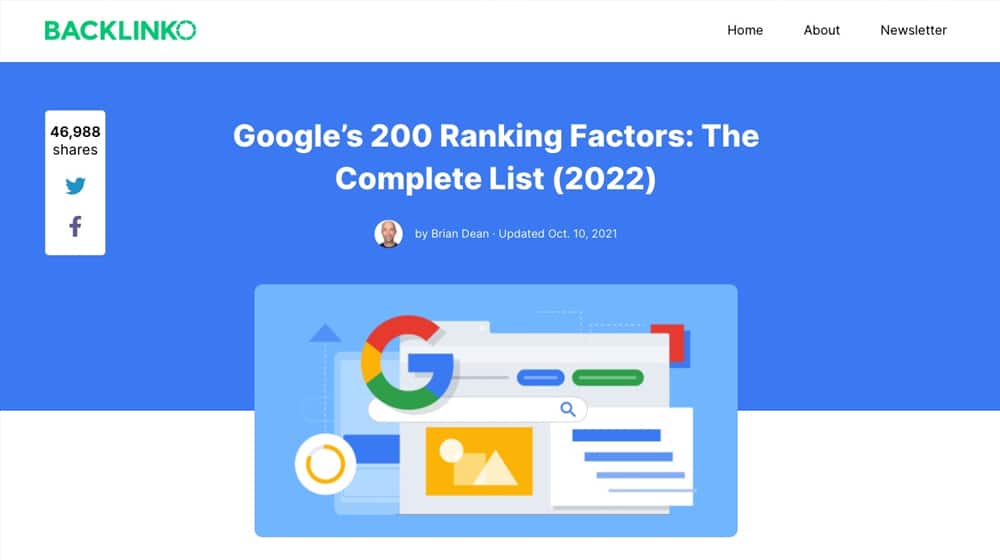
For the most part, they became respected and well-known because of blogs. One of the primary goals of content marketing as a whole is to position yourself as a thought leader within your industry, which opens up doors to opportunities, partnerships, and more.
Thought leadership involves using your blog not just to write guides and resources but to write "think" pieces and discussions that dig into theory and predictions. This expertise is another intangible benefit, but it's very potent. You want to showcase you don't just know what's going on around you, but you're capable of accurately looking ahead.
12. Thought Leadership Builds a Personal Brand
How long are you going to stick with your business? What happens if a significant entity decides to offer to buy you out with a sum of money that you can't refuse? How much of your ability to move on to a new project is tied to your brand?

The best way to insulate yourself against his is to build a personal brand. Attaching your name to your content is a good start, but you can also leverage your thought leadership, get published on sites like Forbes, build a personal blog, and so on. All of that starts with your blog.
Remember, not all users visit your social media profiles directly. Many of them log into their social media accounts every day but don't necessarily care enough to follow you. If you write engaging content and your readers find that content – either because they visit your blog, follow an RSS feed, or just found it through search – they might decide to share it with their friends, family, and followers.
That, too, benefits your social media presence and your blog in general. Add some social media sharing buttons to your blog posts - this encourages every new visitor to your article to share it with their fans. We've seen a single tweet drive tens of thousands of visitors in a single day. You never know what kind of influencer will stumble across your post.
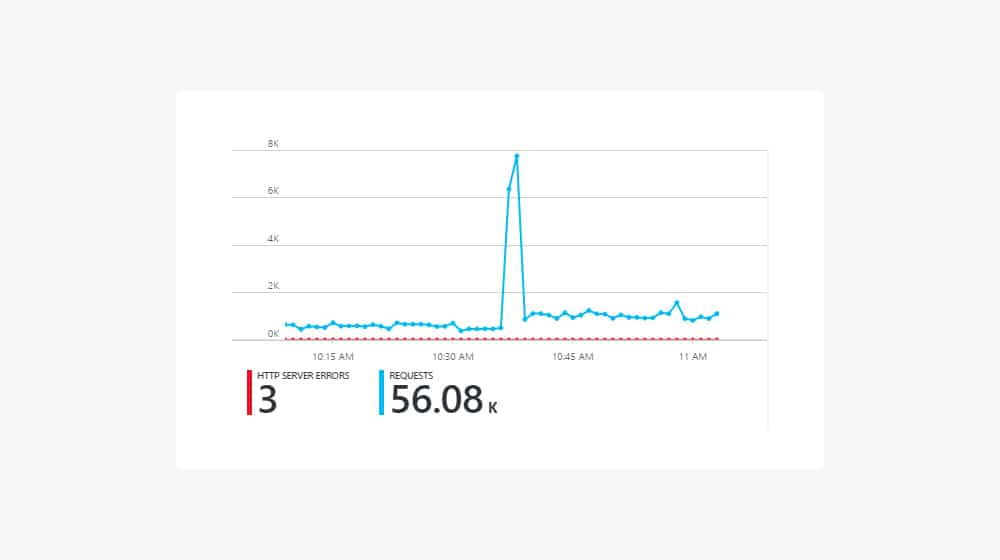
Social media marketing isn't the Hot New Thing it used to be, but it's still quite valuable. Every piece of content you write should be shared on social media, whether it's Facebook, Twitter, Instagram, LinkedIn, or whatever else. Every one of them has the chance to capture the public consciousness at just the right time and get shared far and wide, and that's always a highly beneficial event.
The trick, then, is leveraging that influx of traffic into a further long-term benefit.
Listen to what those people have to say, iterate upon it, and grow. That feedback can guide more posts in the future, for example, and it can inspire further engagement from those communities, building a feedback loop between their hub and your blog.
14. Bloggers Will Want to Write for You (or You Writing for Them)
The more content you have, you get more exposure and are found by more visitors. As you grow, other bloggers will start to discover you and can even ask about guest posting. You can post on their sites, or they can post on yours, and either way, it ends up beneficial to both of you.
Of course, you have to do a lot of filtering and common-sense revision to make sure you gain real benefit from such a relationship. Guest posting isn't easy, and there are a lot of pitfalls to the practice, but it can be great for your SEO when appropriately handled.
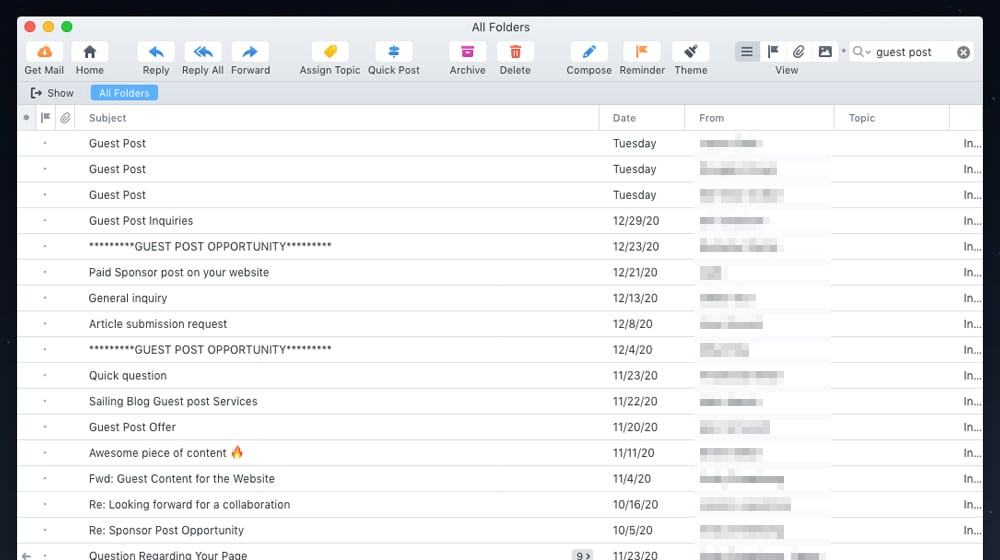
Of course, this is more of a con than a pro for some webmasters, especially if you already have a content marketing company handling your work. If you don't want to spend the time filtering out spam, or if you don't want to mess with your content quality, you may want to skip guest blogging.
15. You Can Use Your Content as a Portfolio for Your Outreach
Sometimes, you want to reach out to other people instead of other people reaching out to you. If they don't already know who you are, their first question will be exactly that. So, your blog becomes a public portfolio of your expertise, thought leadership, interests, and authority on the subject. You can then use that to leverage authorship opportunities and business deals.
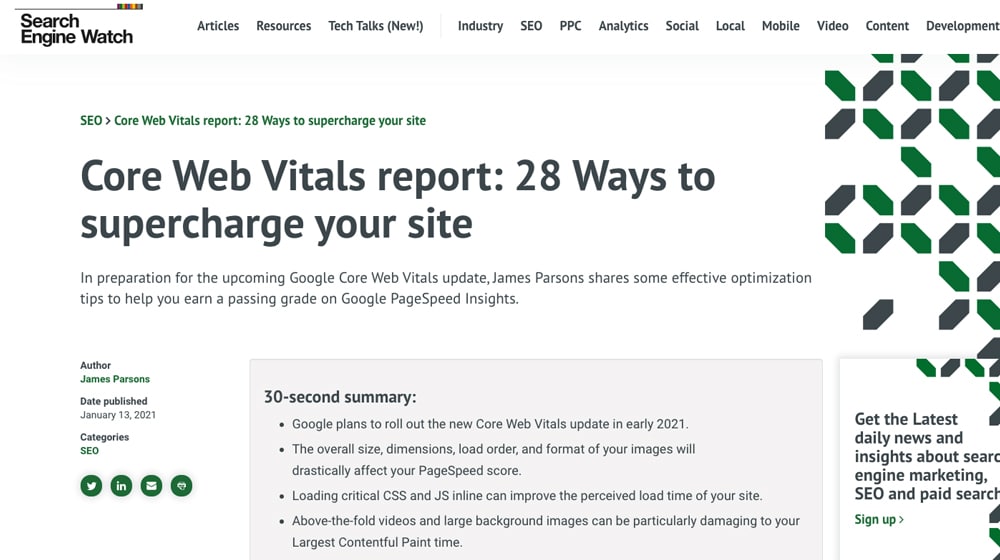
A good blog can make or break a business relationship, even growing beyond mere content swaps and other blog-based networking.
16. You Can Repurpose Content into Other Forms of Media
I'm a big fan of repurposing and recycling content that you've already created.
A blog post doesn't have to be just a blog post. It can be a core piece of information or a premise for an argument you want to make and be spun off into dozens of pieces of content, from slide decks to videos to podcasts to infographics. You're investing in making that content, and it can benefit you in many different ways.

For example, we've recently written an article about how you can turn a collection of blog posts into an eBook. Get creative and take advantage of the content that you've already written.
17. Media in Blog Posts Can Reach Other Search Engines
Blog posts rank in Google and Bing, but did you know they can reach other search channels as well? One of the biggest, for example, is Google Image Search. Every image in your post has context surrounding it and can be further optimized with alt text, captions, file names, and other metadata that helps Google index it.

Then, people browsing image search can find it as a whole new channel you weren't accessing before. It's free value! The only thing you have to do is add alt tags to your images. There are even free WordPress alt tag plugins to make this easier or automate the process.
18. Content Can Be Syndicated for More Exposure
Another way your blog can fuel your SEO and traffic, lead generation, and other forms of value is through syndication. From Yahoo News to Medium, many places form syndication deals to republish content from other blogs.
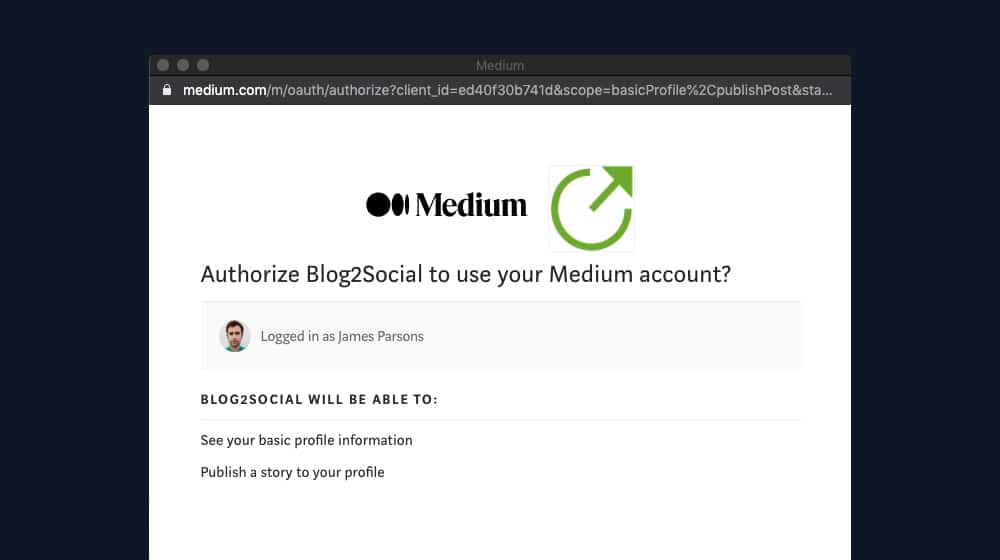
Syndicating your content is a great way to get more exposure, and you will draw more people into your sphere of influence.
19. More Content Means More Stable Rankings and Metrics
Have you ever thought about putting all your eggs in one basket? The metaphor is about losing them; they all break if you drop the basket, and now you have no eggs. The same goes for a blog; if you only produce a few pieces of content, even if those pieces are great, they're fragile. If someone else makes a better version, or if Google decides to delist one for some reason, you're in free-fall. The broader your content base, the more stable your value is against attack from any angle, intentional or otherwise.
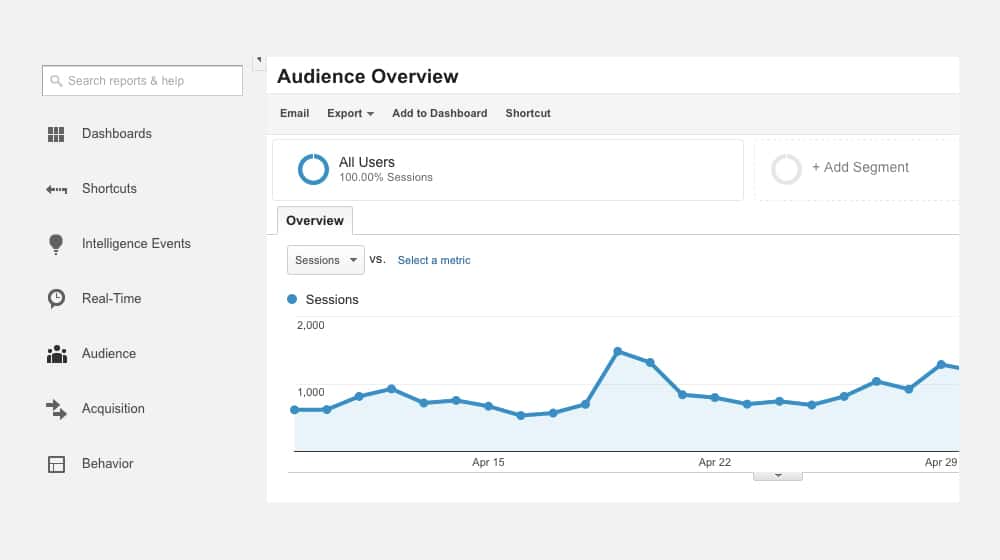
Content quality always beats content quantity, of course, but it's hard to beat a site that has been consistently blogging once a year for the past few years. If you aren't blogging at all, that website likely has far more traffic than you.
20. Every Post Helps Every Other Post Succeed
Every post is an opportunity. Moreover, everyone brought into your sphere of influence by that opportunity is someone who has the chance to engage with, click through to, or read more content on your site. Every post helps boost your site, and as the whole of your site gets better, every post gets better.
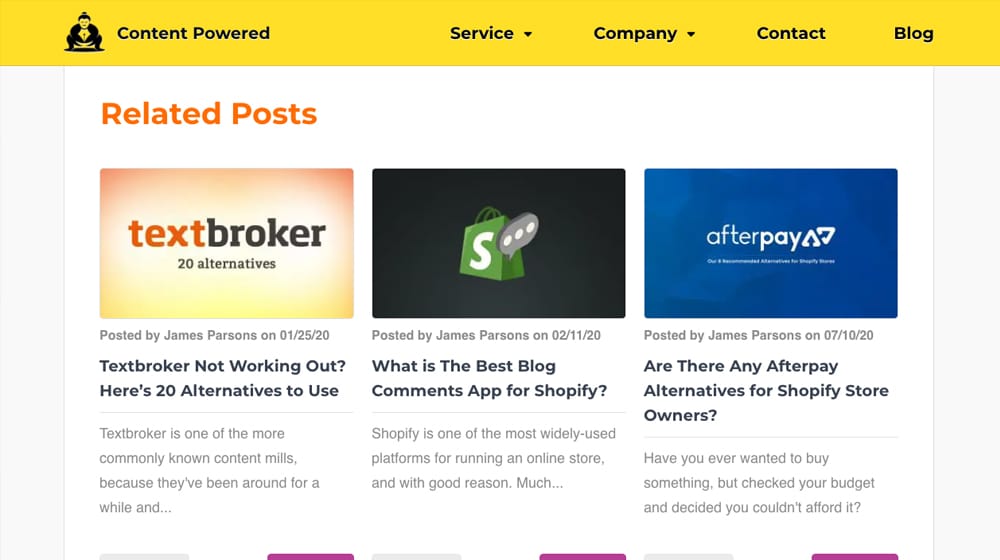
It's a snowball effect, with every flake you add making the whole thing more significant and successful. For example, adding a "Related Posts" section to the end of your articles keeps users on your site and helps them discover new content on your website.
21. More Pages Means More Internal Links
Internal links are considered tangible value to your blog. You can never have too many internal links.
Unfortunately, internal links are often overlooked or neglected by bloggers. Linking from one blog post to another within your site has SEO and user experience benefits such as improved relational awareness, improved indexation, and some tertiary benefits that I'll mention later. Every post is a chance for a handful of internal links to help spread value throughout your website as a whole.
The more posts you have, the easier it is to add more internal links to your content because you'll have more possible web pages and more coverage of more topics to link to. Eventually, over time, your library of content will be so extensive you can link practically any subject to another post you've written about the subject.
Internal links aren't just beneficial directly; they're also helpful indirectly. For example, internal links give users a chance to keep clicking on your site and stick around a little bit longer.
When the visitors stay on your website for a long time, your dwell time increases. Dwell time is a semi-controversial metric; some people don't think it matters directly to SEO, while others do.
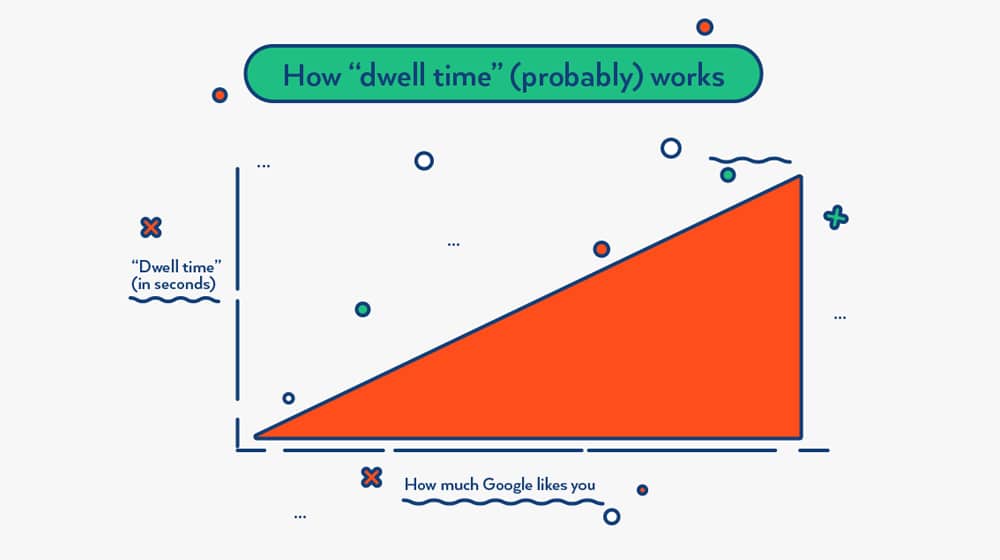
I think it's good to boost one way or the other, so getting more content and interlinking it with other content on your blog is always going to be a good thing to do. It improves your time on site, reduces your bounce rate, and improves your chances you'll get a conversion. What's not to love?
22. Content Can Directly Respond to User Questions
Building an audience isn't always enough. Often, it pays to pay attention to your audience. What are your visitors talking about? What concerns them, and what questions do they have? One of the best ways to find new topics to write about is to ask your audience what concerns they have and what questions they would ask if they could.
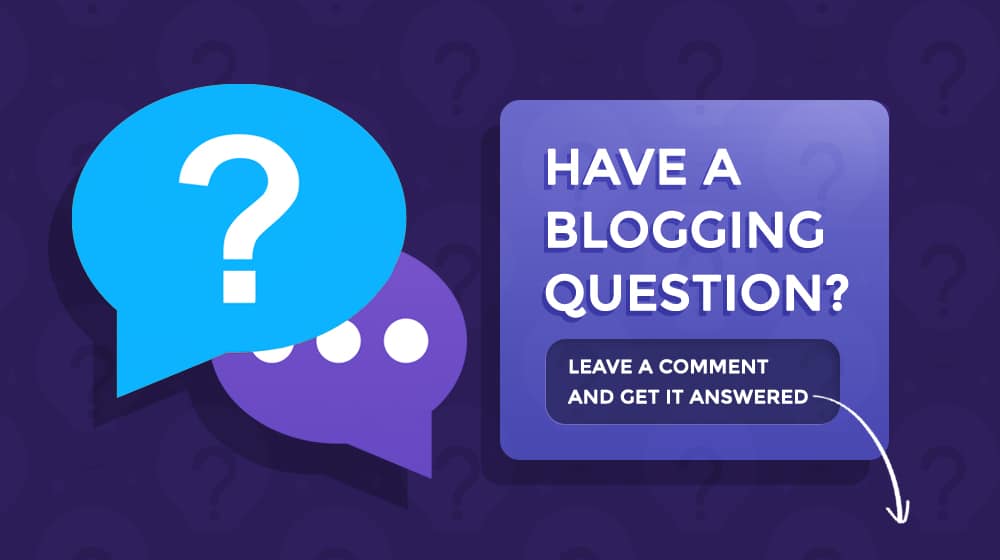
Then, answer those questions and concerns in your next blog posts. You gain a more engaged and proactive audience by being directly responsive to feedback and questions.
23. Comments Increase Your Page Content (For Free)
When you build a blog, one of the things you create is a community. I'll talk more about that specifically later, but first, the community does this for you by leaving comments on your blog. Blog comments are always an excellent resource for you.
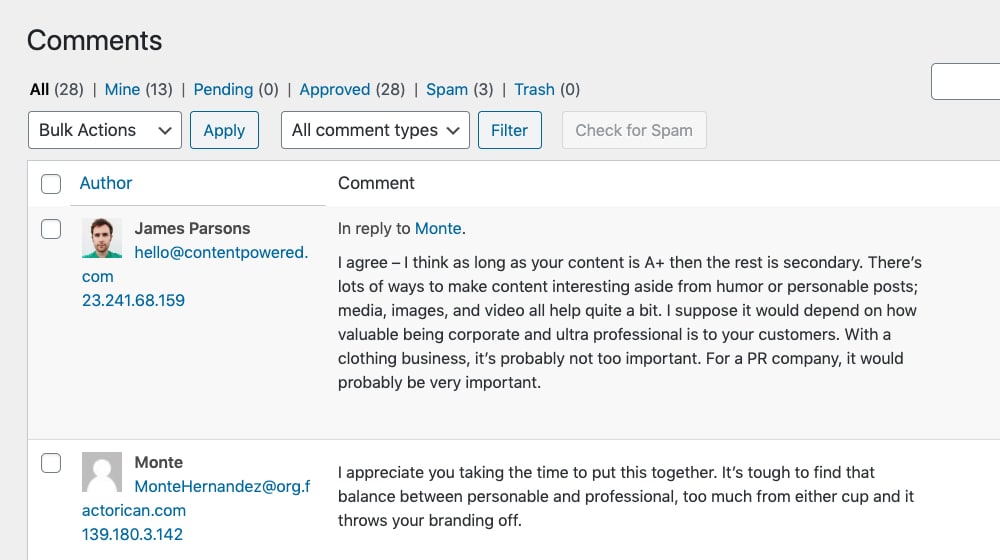
They can add relevant keywords related to your content but that you couldn't fit in, and they help you build a sense of community by responding to and fostering them.
I've seen some very compelling discussions happen in the comments, and by replying to them and contributing to the conversation, I'm adding significant value to my article. After your users leave a comment, you can reply and add even more weight. Some of my blog posts have an extra 1,500 words, exclusively from constructive blog comments. Some bloggers like Neil Patel or Brian Dean have tens of thousands of additional words in their blog posts from their comments. Those comments also add extra long-tail keywords to your content, which improves the number of keywords that your content ranks for.
It's no wonder that they're ranking number one for ultra-competitive search queries. I'm a firm believer that blog comments are one of the best ranking factors, though very few marketers are discussing it.
You become more than just another blog; you become an entity that people recognize, engage with, and enjoy. Blogging is, as usual, the foundation of accomplishing this.
24. Blogs Let You Use More Schema Markup
Schema is HTML metadata (similar to meta titlea and meta descriptions) that you can add to your site to give more rich data to Google for indexation purposes. Some of that data can be used for special features in the SERPs, like star ratings, authorship information, and even post category.
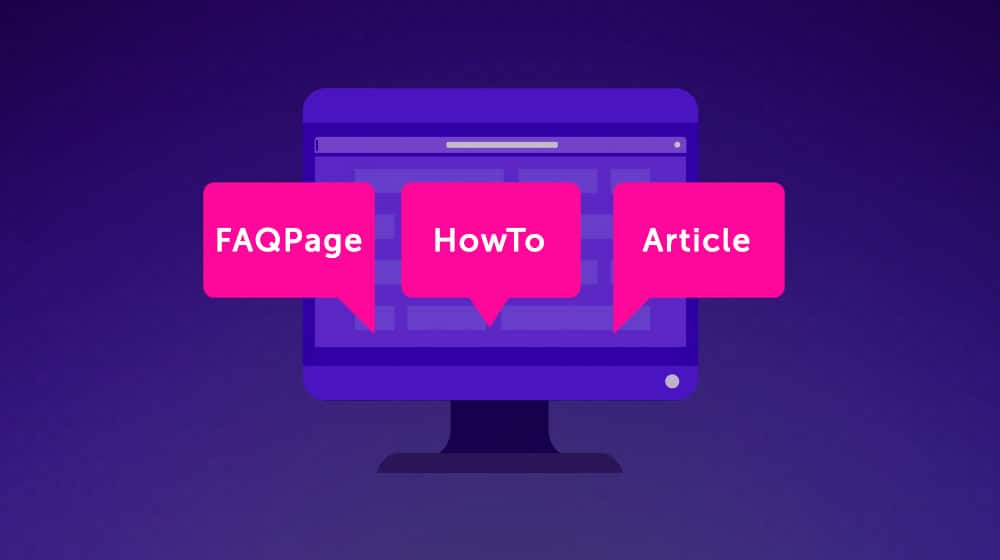
Your blog lets you explore different kinds of content and format and use different Schema types for optimized SEO.
25. Your Blog Lets You Out-Shine Competitors
Above, I mentioned that one of the threats you face with a small blog is someone else coming along and writing the same thing you did, but better. You can do the same thing, though. By climbing up the backs of your competitors, you can reach new heights much more quickly than you otherwise could.

Look for content that's a step or two above yours, and try to out-do it.
26. A Blog Builds Trust from Users, Even If They Don't Read It
Often, a blog can make a difference. If you were interested in buying a product in a narrow niche with few players in the space, how do you know who to trust? Even if you don't read the blog, just knowing that the blog is there allows you to recognize that they're investing in their site, their presence, and their authority.
Now, presumably, you should read some of the content to make sure it's not spam or wildly off-base, but if it's good content, you can assume the company is more trustworthy than a competitor with no blog. Trust is one of the most significant determining factors for customers thinking of making a purchase.
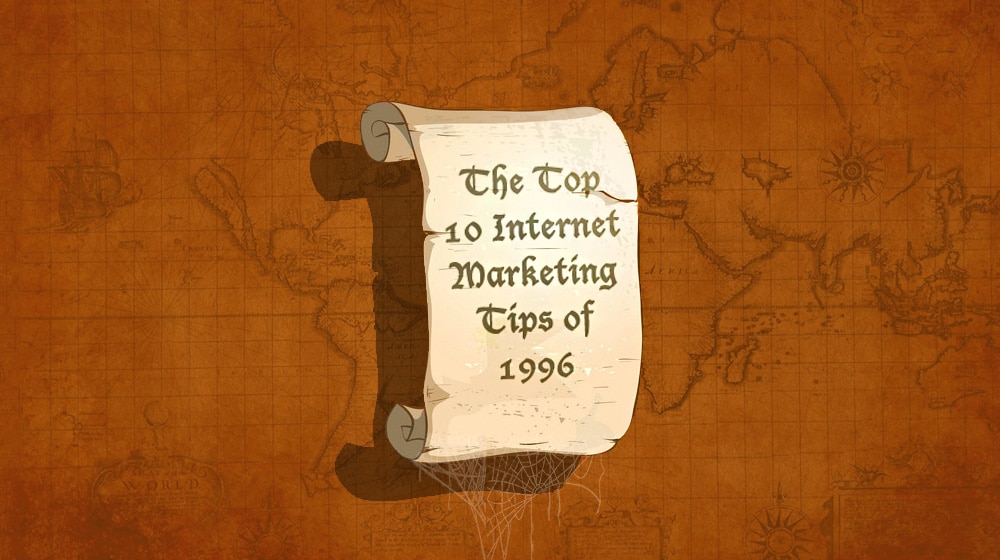
Would you buy from a site that hasn't updated its content in over two years? Neither would I.
27. Better Metrics Across the Board Reduces Overall Costs
There's a trickle-down effect of operating at scale. While the raw costs of a more significant business are, well, more extensive, the cost-per-unit, cost-per-user, or cost-per-conversion can be reduced. More people, more posts, more leads, and more organic traffic; it all gives you more data, which you can then use to optimize. In particular, it means a more accurate target, more authentic engagement, and more effective conversion optimization.
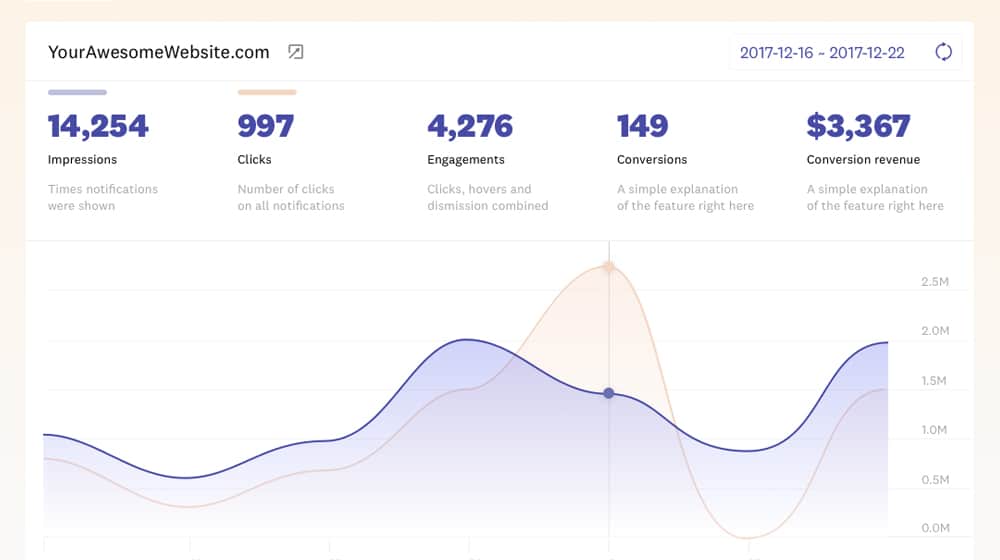
It's essential to ensure that you're using your marketing budget wisely, and blogging is one of the best long-term marketing strategies that there is. I review new websites every week, and some of them are creating thousands of pages that are pulling in very little traffic. If they shifted that strategy to one that attracted ten times the amount of traffic, their leads, conversion rate, and sales would also likely increase.
28. A Bigger Blog Can Enable Selling Ad Space
Unlike PPC ads, display ads are kind of on their way out as a monetization scheme these days, but often things like sponsored posts can still be beneficial.

While not necessarily an SEO benefit, a more prominent blog can benefit you by giving you traffic and space to sell ads. Plus, that's money you can reinvest in other forms of SEO.
29. Blogging Compounds Over Time
Perhaps the most significant benefit to SEO, your digital marketing, and your business as a whole is that your blog never stops growing.
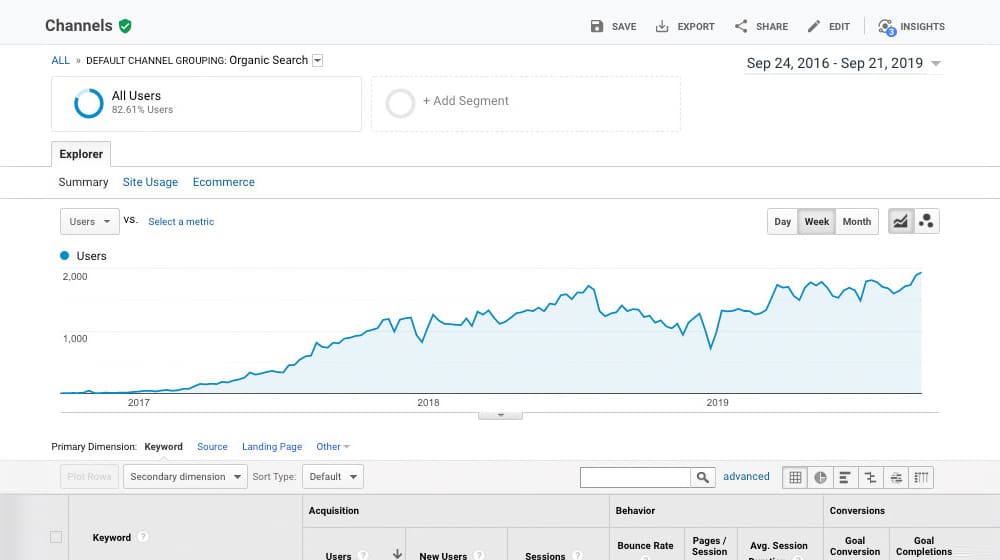
Like all white-hat SEO techniques, it's generally slow to spin up but grows and compounds over itself as you go.
30. Blogging Increases Your Average Content Quality
A lot of the basic pages on your site – the homepage, the About page, product pages – don't have a lot of high-quality content or SEO value. Others, like landing pages and system pages, should be "noindexed" in the first place.
To increase the overall average quality level of the indexed pages on your site, you need to publish high-quality content in bulk and on a regular schedule. Blogging is the best way to do this, though it's not necessarily the only way.
John Mueller of Google said that low-quality and thin pages (hovering around 500 words) could hurt an entire site.
Here's the quote from the video:
"Can low-quality pages on a site affect the overall authority? Yes. Well, I guess it all depends on how you define authority but in general, when our algorithms look at a website, across the board, overall, they do look at individual pages as well. And if there are a bunch of low-quality bad pages on a site then that does affect how we view the site overall. […] That's something that, from my point of view, if you're aware of low-quality pages on your site, then that's something I'd try to fix." - Google Search Central
By publishing long-form and high-quality content, you're increasing your average page quality. You can further improve your page quality by getting rid of your low-quality pages with a content audit. These two things are some of the best things you can do for your site.
31. Blogging Improves Indexing
Every time you publish a piece of content, Google will eventually discover it (barring a reason they won't, like a noindex tag). As more and more content is found and indexed on your site, Google will start to check more often.

This process, combined with using a sitemap that you submit to Google and keep up to date, means you'll have a relatively fast turnaround time from creation and publication to indexation and distribution.
32. Blogging Makes You More Resilient to Algorithm Changes
I see many businesses with a primary "money keyword" that drives the lion's share of their traffic to their business. If there's a massive search engine update, they might lose search engine rankings for that term and lose half of their business overnight.
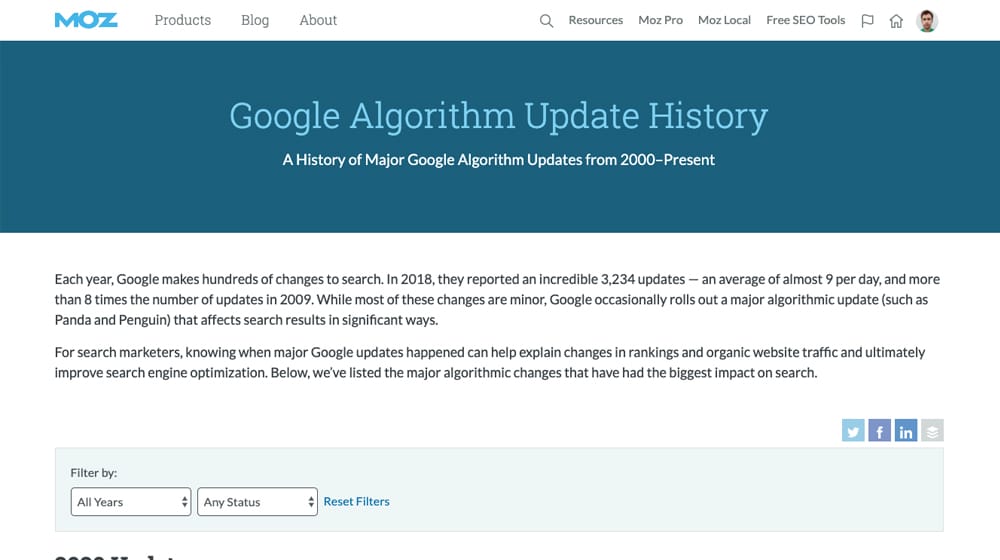
If you have a thousand great blog posts, and each of those posts is attracting new search engine visitors, you're a lot more diversified and resilient to these changes - especially since search engines tend to favor long-form blog content. Just give a Google search for just about any search phrase in your industry, and you'll see how many blog posts show up. It's wild.
33. Blogging Lets You Surface For Unique Page Types
Schema markup can improve your search engine rankings and presence, and there's rich markup that you can use on your blog posts.
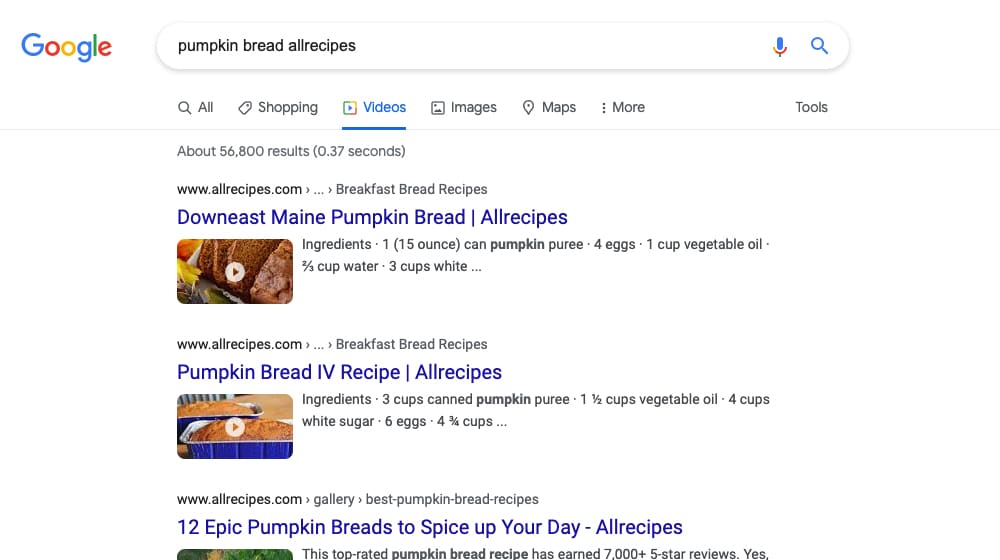
Any time you can find an opportunity to use this stuff – like writing reviews with star ratings, recipes, reviews, FAQ pages, writing instructions with steps flagged, or even just writing rich content – you'll find that post performing better than the same post without that markup. Repeat this often enough, and you can see significant benefits to your SEO.
34. Blogging Grows Your Email List
A call to action is the core of making a blog work for you. Every good blog post has some form of a call to action to another page on their website. It might be a product, a service, an eBook, or just a newsletter, but it has to be there. These help your business and your site, in general, by boosting your SEO and encouraging users to stick around and do more on your site. They help reduce your bounce rate, and search engines measure visitor engagement.

A simple call to action will promote and add users to your email list. You can share your latest blog posts with your subscribers. When readers discover your blog post, some will share it on social media. They might even blog about it on their site. A newsletter can be surprisingly effective for indirectly building links and growing your authority. Plus it's just good business sense to diversify your marketing channels.
Every time you publish a new blog article, you can share that post on your social media profiles. To most people's surprise, you can often share that post more than once, or even more than a few times, and continually get more traffic and value out of it.
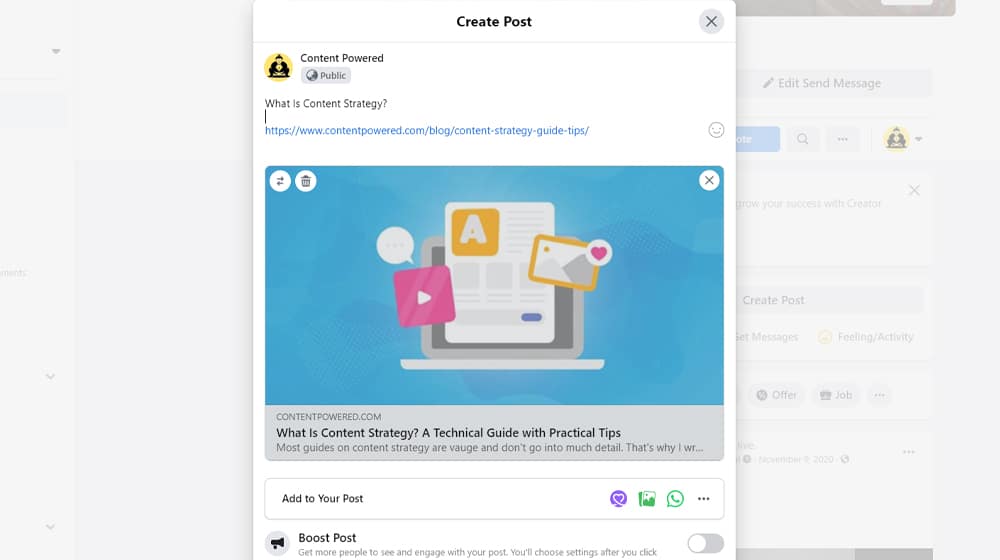
Social media users are all logging into their profiles at different times of the day. Since social media relies on fresh new posts, it helps to get many posts on your social profiles. You're reaching a higher percentage of your fanbase by posting the same post a handful of times. This generates more exposure to your content. It brings more eyes to your profile and draws more people into your ecosystem.
Like email marketing, you can also use your blog posts to funnel users to your social profiles. This process draws users into your orbit, grows your following, and gives you a larger target audience to market to later. A good call to action is one with low friction (think "Free trial" instead of "Buy now"), and a follow on your social profiles isn't too much to ask.
36. Blogging Improves Your EAT Score
Google's Expertise, Authority, and Trust scores are part of the overall ranking of quality and utility a site has and are a reflection of how well a site can rank.

The more relevant content you publish – as long as the content is relevant, on-topic, and accurate – the more you'll build up that EAT score and rank higher for it. Every blog post helps with this, no matter how much or how little traffic it gets.
37. Blogging Promotes Your Videos
If you have a YouTube channel and regularly upload videos, write a blog post or two on the subject!
Creating and posting a video to YouTube has a lot of benefits, but embedding that video in a blog post can help it immensely. Not only will your blog post engagement improve from increased dwell time and engagement, but your article will be more valuable, and your video will generate additional views from every visitor to your blog post who watches it. It's a great symbiotic relationship.
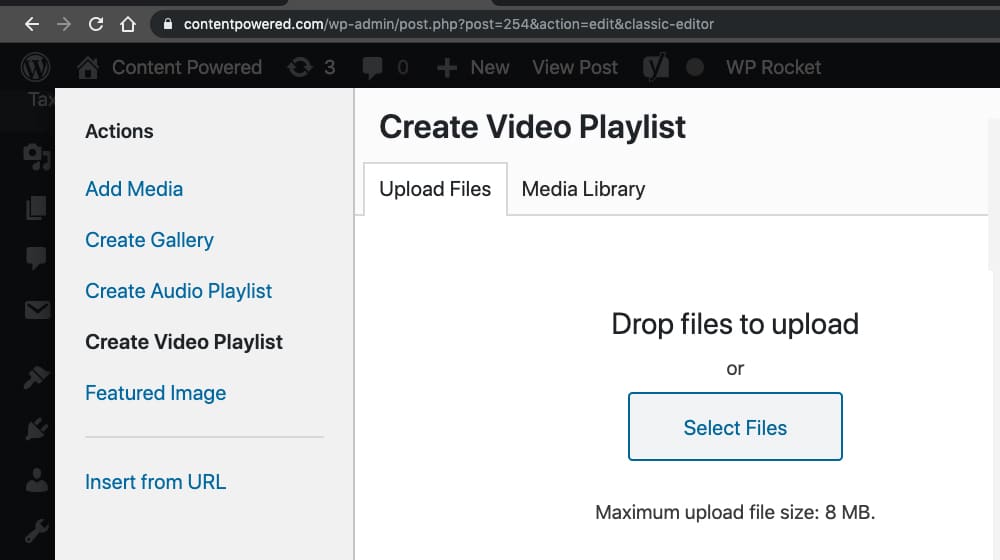
You can consider expanding on your YouTube videos in greater detail, providing sources to cite your claims, and then embedding your video (or multiple videos) throughout the blog post. Monitor your "Session Duration" metrics as well as your video views over the next 6-12 months. You'll be surprised by the results.
38. Blogging Shows Visitors and Search Engines That The Lights Are On
If a website hasn't published anything new in years, who's to say that there's anybody home?
A massive percentage of the web is static. That means a business or person launches a website, polishes it up, and doesn't change much or add to it. If you look at it five years from now, it seems the same.
Is there a problem with that? Well, there can be.
For one, search engines will come by less often. Search engine bots are efficient and conserve their resources, so if you last changed your website five years ago, what are the odds that the admin will change it tomorrow or a month from now? Search engines understand this as well, and their bots will adjust and slow down their crawling frequency accordingly, so they stop coming by as often. They'll also have less confidence that your website is being maintained and that your content is still accurate.
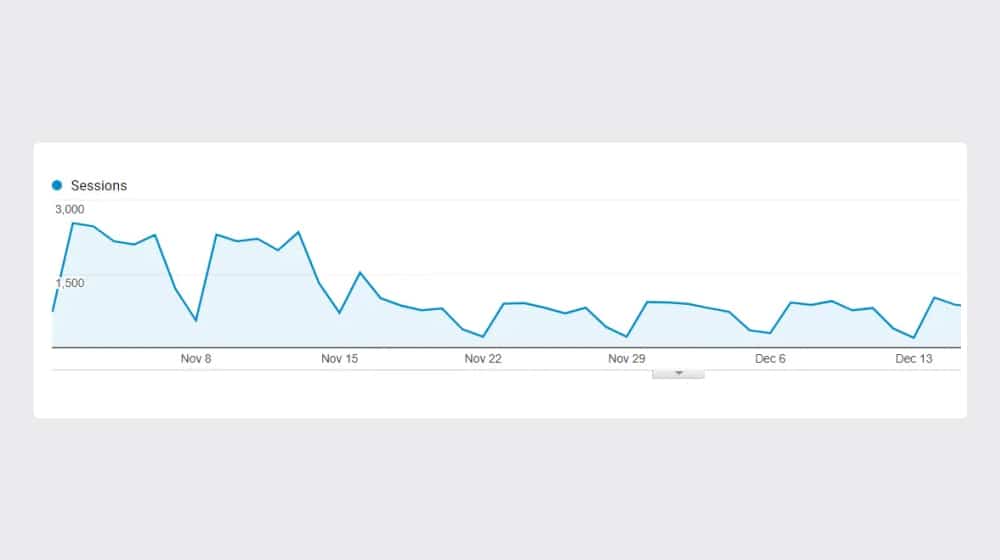
Another downside is that your visitors won't be able to see any new changes either. Blog posts can act like a heartbeat for a business; you see new content that the admin published within the past week, and you at least know that somebody is still working on the website.
All of this is to say that a blog can benefit your site in many different ways. Isolated and taken alone, picking one of these reasons won't add up to much. Together, they can snowball your website into a major powerhouse and brand name known nationally or globally. Blogging is one of the best things you can do for a business, so why not get started today?
Do you have any questions for me about how blogging influences your SEO? Do you have any SEO tips of your own, or did I leave any blog benefits out from this list? Please let me know in the comments! It would be great to get a conversation started.



 30 Second Summary
30 Second Summary

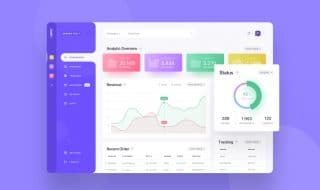

March 07, 2022
I agree with everything you've listed. We've only been blogging for a few years but our SEO and rankings have significantly improved.
March 09, 2022
Thanks Fabio! Love to hear it.
March 08, 2022
Well, if I wasn't convinced then, I'm definitely convinced now.
March 09, 2022
Hey David,
That's awesome! I'm glad to have inspired you to start a blog.
Check out some of my other articles, I spill all my secrets here 🙂
June 09, 2022
Just wanted to say that you've inspired me to start as well. Wish me luck!
June 09, 2022
Hey John! Nice - you don't need luck, you got this!
March 11, 2022
These all sound great but how long does it take to see these results? We've started a couple of months ago but I'm becoming a bit concerned we've wasted our resources. I'm not sure what we're doing wrong.
March 15, 2022
Hey Mark!
It can take 6-12 months for a blog that is doing everything right to start seeing some levels of success.
There's wisdom floating around there like "quality over quantity" and "blogging takes time - be patient!" both of which are true.
However, "quality" means a lot of different things, and "takes time" is vague.
If the average blog post you're competing with is 1,400 words and you're writing 800, it will be harder to compete. Your competition is likely writing better versions of your content, and outranking them may not be possible with that level of effort.
Let's say you're being patient with that strategy. You could patiently wait for 1, 2, or even three years without seeing much additional traffic. So, in this case, waiting patiently for something to happen isn't the best strategy.
Blogging is a combination of these two things: creating the best possible content that you can and sticking with it—building an audience, getting better with every passing day, improving old content, outdoing the competition, finding ways to make your posts more attractive, and so on. It's a ton of work.
So, as long as you're doing all of those things, my best advice is to be patient and stick with it. Carefully research blog topics before writing about them, stay laser-focused on the subject when you're writing, outdo the competition at every turn, and continually work to improve your content and your user experience. It's pretty hard to go wrong with this strategy.
April 29, 2022
Hi James, I just wanted to say this was super helpful!
Thank you for the thoughtful and detailed answer.
April 29, 2022
Thanks Ishmael! No problem 🙂
March 16, 2022
Great list! While I do like sticking to evergreen content, do you think it might be useful to post some non-evergreen content every once in a while?
March 25, 2022
Hey Manny!
Absolutely! I occasionally mix in linkbait posts and pillar posts (this article is more of a pillar post than evergreen, or perhaps a hybrid).
I try to avoid time-sensitive content because it has a short half-life, but that's the bread and butter for magazines and news sites.
Some sites only focus on social "clickbait" type content, like Buzzfeed.
There's no right or wrong answer, but each has a different strategy. It's a good idea to test these out and determine which approach works best for you.
March 17, 2022
I've decided to pursue blogging but I'm not sure where to start. Do you have any tips?
March 25, 2022
Hey Brandon!
Here's a few guides that I recommend starting with:
Content writing tips for beginners - https://www.contentpowered.com/blog/content-writing-tips-beginners/
How to find blog topic ideas - https://www.contentpowered.com/blog/blog-topic-ideas-tools/
How to optimize your blog for SEO - https://www.contentpowered.com/blog/blog-optimization-tips-seo/
I hope these help!
May 26, 2022
These are all very helpful, James. Thanks a lot!
May 26, 2022
Hey Albert, not a problem! I'm really happy they were useful to you.
April 13, 2022
Thanks for putting this together!
April 13, 2022
Hey Jim, you're welcome, I'm happy that it was useful to you!
June 28, 2022
Awesome and inspiring stuff. Thanks.
July 21, 2022
That's what I wanted to hear! Thanks Tony, appreciate the kind words 🙂
July 11, 2022
I appreciate this a lot. You always have great articles.
July 21, 2022
Thanks Kumar!
July 18, 2022
Wow! This is a great list. I'll send this to a friend who's still on the fence about blogging.
July 21, 2022
Hey Amanada! Cheers, thanks for the share 🙂
September 06, 2022
This list is a good motivation to keep going! Fingers crossed we'll start seeing these benefits soon!
October 07, 2022
You got this! Feel free to reach out if you need help or have any questions. Happy to take a look at what you've done so far.
September 27, 2022
This is a great list to check if we're maximizing our SEO benefits from blogging!
October 07, 2022
Thanks Gerry! Cheers 🙂
October 03, 2022
That is a lot of great benefits! It sure seems like I should consider blogging already.
October 07, 2022
I may be biased since blogging is my entire career, but, I would have to agree with you!
April 03, 2023
Hello there! I just wanted to let you know how much I enjoy your Digital marketing blog! As someone who is just getting started in the field, I find your articles to be extremely helpful. Informative and simple to understand. I especially like how you break down complex topics into bite-sized chunks that are easy for someone like me to understand. Your tutorials are clear and concise, and I always feel as if I've learned something useful from them.
April 06, 2023
Thanks Rani!
April 30, 2023
Great content! Thank you for all the information granted with this great post!
May 01, 2023
Thanks Tina!
December 02, 2023
Wow! This is a great list. I'll send this to a friend who's still on the fence about blogging
December 13, 2023
Thanks Selina!